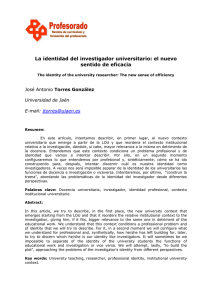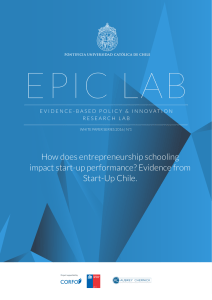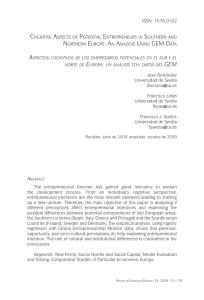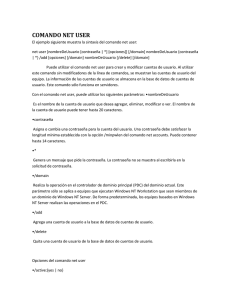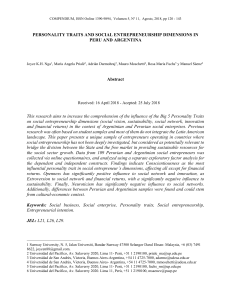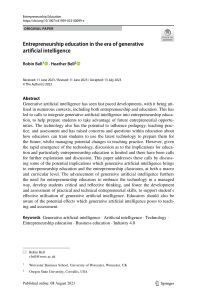Título: Institutions and entrepreneurial activity: a quantitative
Anuncio
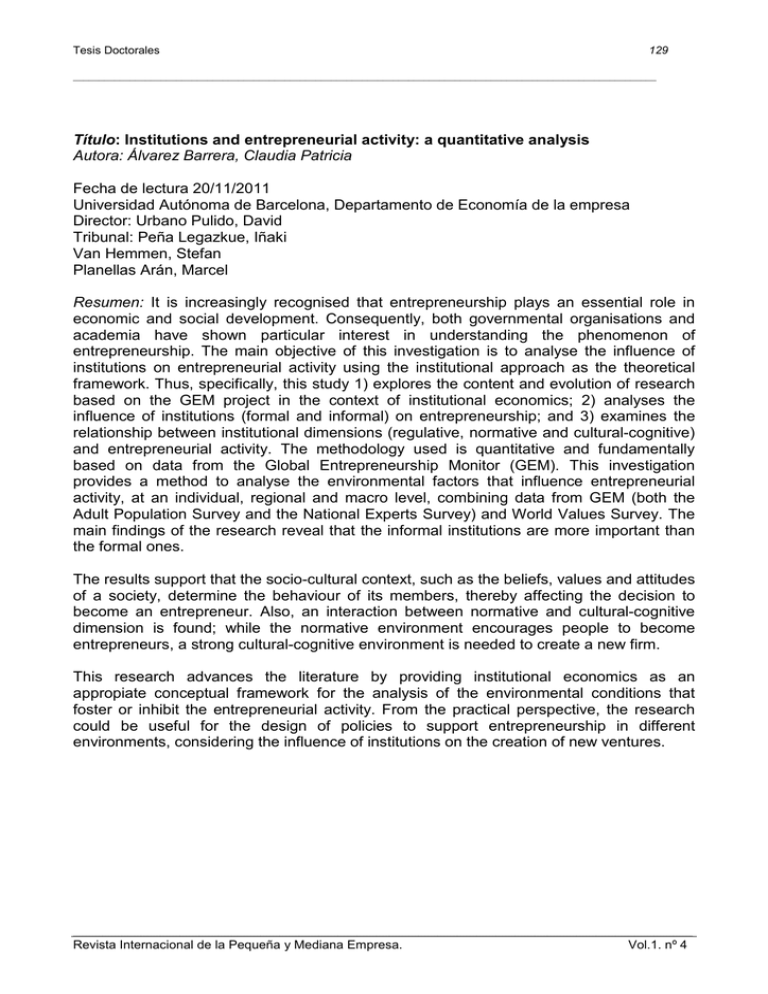
129 Tesis Doctorales _________________________________________________________________________________________________________________ Título: Institutions and entrepreneurial activity: a quantitative analysis Autora: Álvarez Barrera, Claudia Patricia Fecha de lectura 20/11/2011 Universidad Autónoma de Barcelona, Departamento de Economía de la empresa Director: Urbano Pulido, David Tribunal: Peña Legazkue, Iñaki Van Hemmen, Stefan Planellas Arán, Marcel Resumen: It is increasingly recognised that entrepreneurship plays an essential role in economic and social development. Consequently, both governmental organisations and academia have shown particular interest in understanding the phenomenon of entrepreneurship. The main objective of this investigation is to analyse the influence of institutions on entrepreneurial activity using the institutional approach as the theoretical framework. Thus, specifically, this study 1) explores the content and evolution of research based on the GEM project in the context of institutional economics; 2) analyses the influence of institutions (formal and informal) on entrepreneurship; and 3) examines the relationship between institutional dimensions (regulative, normative and cultural-cognitive) and entrepreneurial activity. The methodology used is quantitative and fundamentally based on data from the Global Entrepreneurship Monitor (GEM). This investigation provides a method to analyse the environmental factors that influence entrepreneurial activity, at an individual, regional and macro level, combining data from GEM (both the Adult Population Survey and the National Experts Survey) and World Values Survey. The main findings of the research reveal that the informal institutions are more important than the formal ones. The results support that the socio-cultural context, such as the beliefs, values and attitudes of a society, determine the behaviour of its members, thereby affecting the decision to become an entrepreneur. Also, an interaction between normative and cultural-cognitive dimension is found; while the normative environment encourages people to become entrepreneurs, a strong cultural-cognitive environment is needed to create a new firm. This research advances the literature by providing institutional economics as an appropiate conceptual framework for the analysis of the environmental conditions that foster or inhibit the entrepreneurial activity. From the practical perspective, the research could be useful for the design of policies to support entrepreneurship in different environments, considering the influence of institutions on the creation of new ventures. ________________________________________________________________________________________________________________________________________________________________________________________________ Revista Internacional de la Pequeña y Mediana Empresa. Vol.1. nº 4 Tesis Doctorales 130 _________________________________________________________________________________________________________________ Título: Hacia un enfoque integrado de Marketing y Supply Chain Management: aplicación al contexto PYME español Autora: López Pérez, Rocío Fecha de lectura 09/02/2011 Universidad Pablo de Olavide, Departamento de Administración y Dirección de Empresas Fecha de lectura: 09/02/2011 Directores: Galán González, José Luis y Jesús Cambra Fierro Tribunal: Polo Redondo, Yolanda Jiménez Thomsen, Cristina Valle Cabrera, Ramón Leal Millán, Antonio Genaro Martínez Salinas, Eva María Resumen: Esta investigación pretende caracterizar el marco conceptual que reconoce vínculos entre el marketing y la gestión de la cadena de suministro. Además, se desea contribuir a la literatura especializada en el contexto PYME. Para ello se realiza un estudio empírico, basado en un caso múltiple, que pretende demostrar en qué medida las pautas que establece la literatura se cumplen en dicho contexto. El estudio, de naturaleza inductiva, permite identificar tanto las relaciones que existentes entre áreas funcionales (intra-empresa) como los mecanismos concretos que las empresas de menor dimensión valoran en la gestión de relaciones en el ámbito de cadenas de suministro (interempresa). Finalmente, también se identifican oportunidades para investigaciones futuras. ________________________________________________________________________________________________________________________________________________________________________________________________ Revista Internacional de la Pequeña y Mediana Empresa. Vol.1. nº 4




